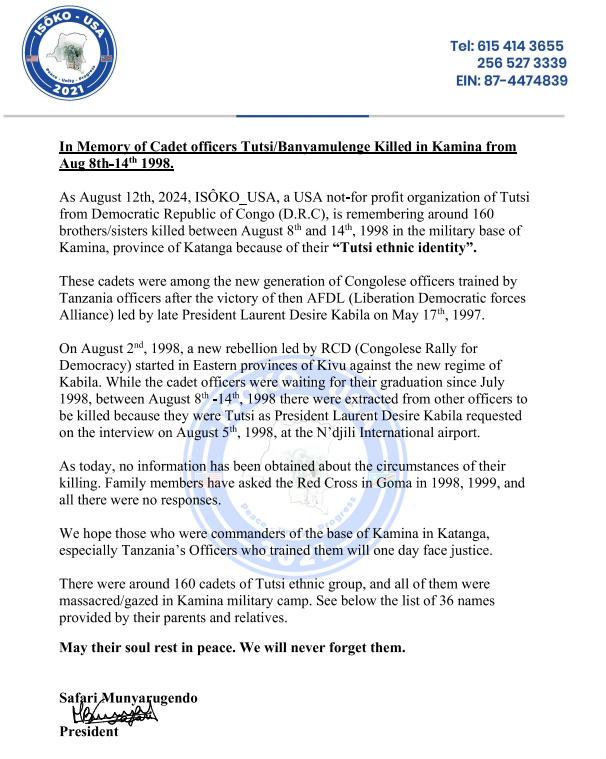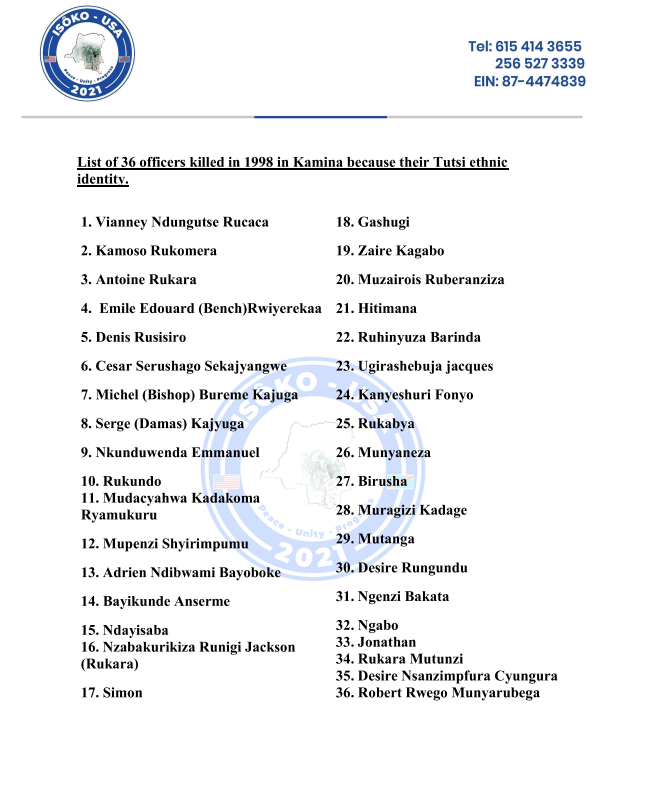A U.S.-based advocacy organization representing Congolese Tutsi, ISÔKO_USA, has commemorated the 26th anniversary of the Kamina massacre, one of the darkest episodes in the Democratic Republic of Congo’s post-independence history.
Between August 8 and 14, 1998, at least 160 Tutsi/Banyamulenge military cadets were summarily executed at the Kamina military training base in Katanga Province, allegedly because of their ethnic identity.
The killings, according to survivors, families, and community leaders, were carried out by elements of the Congolese army following orders at the height of a new rebellion in the country’s east.
A Generation of Soldiers Wiped Out
The young cadets, many of them in their late teens and early twenties, were among the first group of Congolese military officers undergoing training following the rise to power of the Alliance of Democratic Forces for the Liberation of Congo (AFDL), led by the late President Laurent-Désiré Kabila in May 1997.
Trained by Tanzanian instructors, the cadets were nearing graduation in July 1998 when political tensions exploded. On August 2, 1998, a rebellion erupted in eastern Congo, spearheaded by the newly formed Congolese Rally for Democracy (RCD). The Banyamulenge cadets already viewed with suspicion due to their ethnicity were immediately targeted.
According to ISÔKO_USA and multiple community sources, the trigger came from Kabila himself. In a speech delivered on August 5 at N’djili International Airport in Kinshasa, Kabila reportedly made inflammatory remarks that called for the elimination of Tutsi within the military ranks.
What followed, sources say, was a systematic purge at Kamina. Over the course of a week, Tutsi cadets were separated from their peers and executed without trial.
Silence, Grief, and a Quest for Justice
Despite calls from families and human rights organizations, the Kamina massacre remains officially unacknowledged by the Congolese government. Attempts by families to obtain information from the Red Cross in Goma in 1998 and 1999 were met with silence. No judicial investigation has ever been launched.
Notably, the Tanzanian military trainers stationed at Kamina during the period have also never been questioned or held accountable, raising concerns of regional complicity or negligence.
ISÔKO_USA President Safari Munyarugendo described the massacre as a “crime against humanity that continues to be ignored.” He called on the international community to take urgent steps to document and investigate the killings.
“These young men were not rebels. They were loyal Congolese cadets preparing to serve their country,” he said. “Their only crime was being Tutsi.”
Honoring the Victims: Names That Must Not Be Forgotten
Although the total number of victims is believed to be around 160, ISÔKO_USA has officially confirmed the identities of 36 cadets through testimonies from family members, military records, and survivor accounts.
The confirmed victims include:
- Vianney Ndungutse Rucaca
- Kamoso Rukomera
- Antoine Rukara
- Emile Edouard (Bench) Rwiyerekaa
- Denis Rusisiro
- Cesar Serushago Sekajyangwe
- Michel (Bishop) Bureme Kajuga
- Serge (Damas) Kajyuga
- Nkunduwenda Emmanuel
- Rukundo
- Mudacyahwa Kadakoma Ryamukuru
- Mupenzi Shyirimpumu
- Adrien Ndibwami Bayoboke
- Bayikunde Anserme
- Ndayisaba
- Nzabakurikiza Runigi Jackson (Rukara)
- Simon
- Gashugi
- Zaire Kagabo
- Muzairois Ruberanziza
- Hitimana
- Ruhinyuza Barinda
- Ugirashebuja Jacques
- Kanyeshuri Fonyo
- Rukabya
- Munyaneza
- Birusha
- Muragizi Kadage
- Mutanga
- Désiré Rungundu
- Ngenzi Bakata
- Ngabo
- Jonathan
- Rukara Mutunzi
- Désiré Nsanzimpfura Cyungura
- Robert Rwego Munyarubega
A Call for International Action
ISÔKO_USA is urging the United Nations, African Union, and international human rights organizations to investigate the killings, document the events at Kamina, and pursue criminal accountability against those who orchestrated or carried out the massacre.
They have also called for recognition of the Banyamulenge community as a vulnerable and historically persecuted ethnic group in the DRC.
“We cannot heal without truth. We cannot move forward without justice,” said Munyarugendo. “What happened at Kamina must never happen again not in Congo, not anywhere.”





